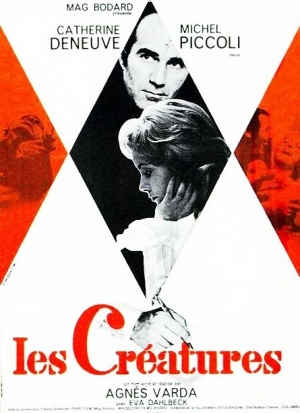Varda’s work here is under-appreciated—a layered and surreal collision of imaginary and abstract ideas about a writer’s creative process, and one might even say a tonal antecedent to the modern pictures of Yorgos Lanthimos.
Dir. Agnes Varda
1966 | France | Drama/Fantasy | 92 mins | 2.35:1 | French
PG (passed clean)
Cast: Catherine Deneuve, Michel Piccoli, Eva Dahlbeck
Plot: A young mute woman, living in a small village, is expecting a baby. Her husband is at the same time writing a novel and using the villagers as his characters.
Awards: Nom. for Golden Lion (Venice)
Source: Cine-Tamaris
Accessibility Index
Subject Matter: Moderate
Narrative Style: Complex
Pace: Slightly Slow
Audience Type: General Arthouse

(Reviewed for Perspectives Film Festival 2019)
Spoilers: No
It may be a stretch to say this, but wouldn’t it be intriguing to see The Creatures as a tonal antecedent to the modern works of Greek auteur Yorgos Lanthimos (of Dogtooth, The Lobster, and The Killing of a Sacred Deer fame)?
It may be a coincidence that those titles have each a name of an animal, but in Agnes Varda’s fourth fiction feature, animals (or creatures) play a significant role insofar as they are construed as imaginary manifestations of a writer’s creative mind.
We follow Edgar (Michel Piccoli), who’s writing a new sci-fi novel where the characters are based on his encounters with several key people in a nearby town. He lives alone with his mute wife (Catherine Deneuve) in a big house in the woods.
Very much made in the spirit of the French New Wave, The Creatures recalls the haunting quality of Alain Resnais’ Last Year at Marienbad (1961), but Varda’s work is certainly less enigmatic, though one might say it is more grounded.
Its use of unsettling violin music, and paired with a restless camera (and even more restless editing), not to mention also conspicuously relying on colour (in a black-and-white film) to signal different psychological realities, give the picture a sense that it needs to be unravelled, though not quite by traditional narrative means (even if it can be plot-reliant), but through an appreciation of the film’s quasi-experimental flourishes.
As such, The Creatures can be quite intellectually demanding and will interest viewers looking for abstraction and symbolism. How does a writer think? How does he live life? Or more perversely, how does he create and manipulate ‘lived lives’?
The second half of the film, which I will leave you to experience, takes a hard-left into some kind of meta-cinematic, meta-fiction mashup. Conceptually, it is exciting to see Varda’s skillful handling of the material.
The Creatures is rarely-seen and certainly under-appreciated—in fact it was a commercial and critical flop at the time of its release, causing Varda to make documentaries instead for the next few years.
As a multi-layered meditation on the surreal collisions of the imaginary (the origins of creativity if you will), literary, cinematic, and existential, The Creatures is a bold work by an extraordinary filmmaker. In the process, Varda also comments on the nature of a failing marriage and its possible salvation.
Grade: A-












[…] Rohmer portrays this visually, be it losing a ticket stub, or having a shoe split open, and much more, all to a recurring dissonant solo violin that sounds rather familiar—might it have been used or did it inspire the music for Agnes Varda’s The Creatures (1966)? […]
LikeLike